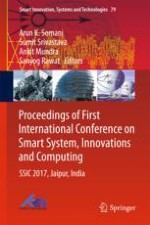2018 | OriginalPaper | Chapter
Assistive Dementia Care System Through Smart Home
Authors : K. S. Gayathri, Susan Elias, K. S. Easwarakumar
Published in: Proceedings of First International Conference on Smart System, Innovations and Computing
Publisher: Springer Singapore
Activate our intelligent search to find suitable subject content or patents.
Select sections of text to find matching patents with Artificial Intelligence. powered by
Select sections of text to find additional relevant content using AI-assisted search. powered by
